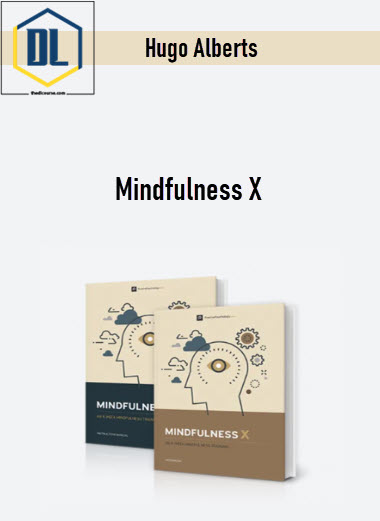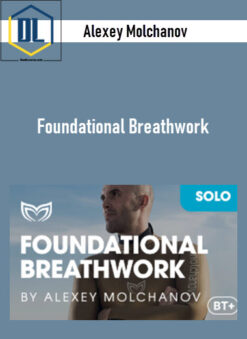Hugo Alberts – Mindfulness X
$550.00 Original price was: $550.00.$88.00Current price is: $88.00.
Delivery: Instant Delivery
Hugo Alberts – Mindfulness X
Mindfulness X© is a comprehensive 8-session mindfulness training package that includes everything you need to offer mindfulness training. It is based on scientific research, comes complete with videos, worksheets, exercises, and slides, and can be taught under your own branding (incl. white label rights).
Mindfulness X was created by a qualified psychologist and researcher Dr. Hugo Alberts who has been exploring the practical and scientific side of mindfulness through controlled lab and field studies for the past 14 years.
He has been a sought-after trainer in mindfulness for many years and in 2010 Hugo developed the Mindfulness X training course as his own methodology for training other practitioners. He’s now offering Mindfulness X to other practitioners in order to increase the number of people he can help through the positive impact of mindfulness.
What You’ll Learn In Mindfulness X
Mindfulness X© includes:
- An Instruction Manual for You as a Practitioner
- A PDF-workbook for Your Participants
- ‘8 Pillars of Mindfulness’ Video Course
- 8 PowerPoint Presentations
- Transcripts of All the Powerpoint Presentations
- Expert Guided Meditations in .MP3
- A Complete ‘Train the Trainer’ Course
- White Label Rights: Use Your Own Brand
- Lifetime Updates to Mindfulness X
Bonus:
- 11 Additional Science-Based Mindfulness Exercises
- A Certificate Template That You Can Reward Your Participants With After Completing the Program
- A Marketing Kit That Will Help You to Reach Your Audience
- A Guide on How to Deliver Mindfulness X Digitally
- Recommended Books, Articles, Movies, Videos and Quotes
Content
You’ll learn to teach the following 8 Pillars of Mindfulness:
- Attention and the Now
The objective of this first session is to familiarize participants with the two most important building blocks of mindfulness; attention and the present moment. At the heart of mindfulness is the cultivation of attention to the present moment. - Automaticity
The goal of this session is to clarify the relationship between mindfulness and automaticity. The reason for this session to be at the beginning of the training is because most problems that people experience involve automatic patterns or habits. Without becoming aware of these patterns, change is difficult if not impossible. - Judgment
An important element of mindfulness is “open awareness”. Open awareness refers to a quality of consciousness that is not evaluative or actively shaped by pre-existing ideas or intentions, but is fully receptive to allowing the experience to simply occur “as it is”. In this session, open awareness is introduced by addressing the evaluative nature of the mind. - Acceptance
The goal of this session is to introduce the concept of acceptance. Mindfulness promotes an accepting stance towards experiences. Rather than fighting or avoiding experiences, mindfulness requires the willingness to experience them. Acceptance, however, is a complex and paradoxical construct. This session aims to clarify the essence of acceptance by learning to apply acceptance to difficult emotions and by explaining the goal of acceptance. - Goals
An excessive focus on the future is perhaps one of the most common obstacles to the cultivation of mindful awareness. The default mode for many people is a “doing mode|” that is constantly focused on reaching goals and the future. In this session, mindfulness is introduced as the key to finding a balance between being in the present moment and planning for the future. Participants will experience the pitfalls of an excessive future focus and explore the benefits of a grateful relationship with the present moment. - Compassion
In this session, participants become acquainted with their inner critic and learn how to effectively cultivate a friendly and caring relationship with the self by increasing awareness of the inner critic and practicing self-compassion through meditation and self-caring action. - The Ego
The goal of this session is to clarify the relationship between mindfulness and the self. At the deepest level, mindfulness practice cultivates a different relationship with the self. The observing stance that becomes stronger after repeated and consistent mindfulness practice allows participants to take a step back from all kinds of thoughts, including identity-related thoughts. - Integration
During the past 7 sessions, participants learned about and practiced many essential key processes underlying mindfulness. Mindfulness is a multi-facetted construct, and an understanding of how the different processes that mindfulness involves work together, can be regarded as an essential insight. In this final session, participants will learn the connection between those different processes.
More courses from the same author: Hugo Alberts
Related products
Instant Delivery
Instant Delivery
Business & Ecommerce
Instant Delivery
Instant Delivery
Wei Qi Feng Laoshi – Self-Healing Methods Of The Circulatory System [Recordings ONLY]
Instant Delivery
Instant Delivery










![Wei Qi Feng Laoshi – Self-Healing Methods Of The Circulatory System [Recordings ONLY]](https://thedlcourse.com/wp-content/uploads/2024/11/Wei-Qi-Feng-Laoshi-–-Self-Healing-Methods-Of-The-Circulatory-System-Recordings-ONLY-247x339.jpg)

